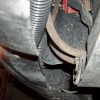aldive
Elite In Memoriam
- Joined
- January 17, 2001
- Messages
- 24,667
- Reaction score
- 28
- Year, Model & Trim Level
- 1999 XLT
I had previously dyno proved, at least on my truck, the Tornado does squat as far as increasing RWHP. I have up till now not tested this apparatus as a means of escalating gas mileage.
I have a friend who purchased a Tornado and installed it in his car. He was extremely disappointed in its performance; he actually lost about one half miles per gallon.
I asked if I could borrow his Tornado to test for gas mileage on my truck; anxious to see my results, he readily agreed.
I had to go to Naples, FL, to help a friend with a project. This was a perfect opportunity to assess the Tornado’s effect on gas mileage. Naples is 100 miles south of my house.
I was using a computer tune that Doug ( http://www.bamachips.com/ ) made for me for gas mileage on 89 fuel.
The test was conducted as follows: I installed the Tornado, a 2 minute job, and filled the truck with BP 89 and drove to Naples at 75 MPH ( GPS determined ). As soon as I exited I75, I refilled with BP 89. I then visited my friend and did some local driving in Naples. Before entering I75, I once again refilled with BP 89 after removing the Tornado. The drive to Sarasota was also done at 75 MPH. Upon arrival in Sarasota, I refilled with BP 89.
Driving impression: I could tell no difference whatsoever in the driving performance with or without the Tornado.
I drove faster than I normally do because of time constraints, so I did not expect to achieve 30 plus MPG. Actual speed ( GPS determined - Dead Link Removed ) was 76.2 MPH on the way South and 76.4 MPH on the North leg.
The drive with the Tornado netted 28.7 MPG whereas the drive without the device netted 29.0 MPG; a net loss of 0.3 MPG.
Conclusion: As seen in the dyno chart below, the Tornado did nothing as far as increasing RWHP. Further, the Tornado actually caused a slight loss in gas mileage.
At least for me, the Tornado proved to be of no value both in power making and gas saving.
I have a friend who purchased a Tornado and installed it in his car. He was extremely disappointed in its performance; he actually lost about one half miles per gallon.
I asked if I could borrow his Tornado to test for gas mileage on my truck; anxious to see my results, he readily agreed.
I had to go to Naples, FL, to help a friend with a project. This was a perfect opportunity to assess the Tornado’s effect on gas mileage. Naples is 100 miles south of my house.
I was using a computer tune that Doug ( http://www.bamachips.com/ ) made for me for gas mileage on 89 fuel.
The test was conducted as follows: I installed the Tornado, a 2 minute job, and filled the truck with BP 89 and drove to Naples at 75 MPH ( GPS determined ). As soon as I exited I75, I refilled with BP 89. I then visited my friend and did some local driving in Naples. Before entering I75, I once again refilled with BP 89 after removing the Tornado. The drive to Sarasota was also done at 75 MPH. Upon arrival in Sarasota, I refilled with BP 89.
Driving impression: I could tell no difference whatsoever in the driving performance with or without the Tornado.
I drove faster than I normally do because of time constraints, so I did not expect to achieve 30 plus MPG. Actual speed ( GPS determined - Dead Link Removed ) was 76.2 MPH on the way South and 76.4 MPH on the North leg.
The drive with the Tornado netted 28.7 MPG whereas the drive without the device netted 29.0 MPG; a net loss of 0.3 MPG.
Conclusion: As seen in the dyno chart below, the Tornado did nothing as far as increasing RWHP. Further, the Tornado actually caused a slight loss in gas mileage.
At least for me, the Tornado proved to be of no value both in power making and gas saving.











